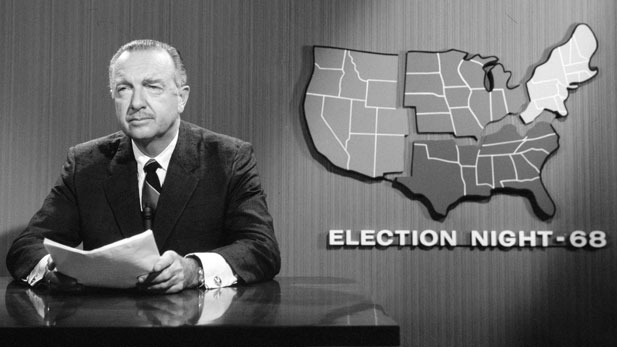Everyone knew Walter Cronkite from the CBS Evening News, where he earned distinction as "The Most Trusted Man in America" during his 19 years at the anchor desk.

U.S. presidential election
Throughout his award-winning career – which began as a field reporter in World War II – Cronkite covered such historic events as the first trip to the moon; the assassinations of John F. Kennedy, Martin Luther King Jr. and Robert Kennedy; the Watergate scandal; the Vietnam War; the Iran hostage crisis; and John Glenn's return to space.
 Through it all, he steadfastly adhered to a credo of fast, accurate and unbiased news reporting. After stepping down as anchorman in 1981, his story continued: Cronkite led the life of a genuine Renaissance man — author, sailor, producer and patron, his public concern for, and commitment to, our world never faltered.
Through it all, he steadfastly adhered to a credo of fast, accurate and unbiased news reporting. After stepping down as anchorman in 1981, his story continued: Cronkite led the life of a genuine Renaissance man — author, sailor, producer and patron, his public concern for, and commitment to, our world never faltered.
When Cronkite resigned in 1981, his audience didn’t really believe it — or want to believe it. It was, wrote a commentator in THE NEW REPUBLIC, “like George Washington leaving the dollar bill.” There were so many requests for interviews and photographs of the departing Cronkite that eventually all were denied. On the final broadcast, he assured his audience that while they would be seeing less of him, he would not be disappearing.
 Always he spoke out for the right and the duty of the citizen to know what is going on in the world. It is a stark moral code he holds up for the reader and the reporter alike. The conceit of the powerful is not the reporter’s concern. A good journalist has only one job — to tell the truth.
Cronkite set the standards of television news when the medium was new and malleable. He was loyal to those standards, and his large audience was correspondingly loyal to him. “He seemed to me incorruptible,” said director Sidney Lumet, “in a profession that was easily corruptible.” It was all that Cronkite wanted — and he achieved it.
Always he spoke out for the right and the duty of the citizen to know what is going on in the world. It is a stark moral code he holds up for the reader and the reporter alike. The conceit of the powerful is not the reporter’s concern. A good journalist has only one job — to tell the truth.
Cronkite set the standards of television news when the medium was new and malleable. He was loyal to those standards, and his large audience was correspondingly loyal to him. “He seemed to me incorruptible,” said director Sidney Lumet, “in a profession that was easily corruptible.” It was all that Cronkite wanted — and he achieved it.
© 2006 Leslie Clark, co-producer, WITNESS TO HISTORY: WALTER CRONKITE

By submitting your comments, you hereby give AZPM the right to post your comments and potentially use them in any other form of media operated by this institution.